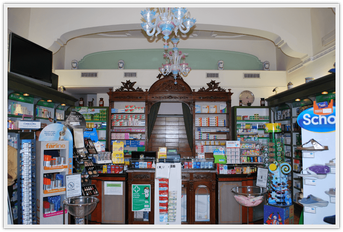 Anyone who has been to Italy and needed to buy a medicine will have experienced the ‘farmacia’ or pharmacy. These shops, identified with the green cross symbol outside, give the impression of yesteryear. Enter and the farmacista, il dottore or la dotorressa will be wearing a white coat ready to greet you from behind a gleaming glass topped cabinet. Prego? This is your invitation to speak. If you want paracetamol you may well get a blank look, in Italy branded aspirin is the main painkiller of choice. If you want an alternative then there is the wonderfully named ‘Moment’ or ibuprofen. If you didn't have a headache when you arrived you certainly will when you are told the price. A small box of a dozen ibuprofen tablets will usually set you back around 8 to 9 Euro - an astonishing 60p per tablet. Shocked at the price you might think next time you can bypass the farmacia and get you medicine at the supermarket, think again. In Italy the farmacisti have a complete monopoly on the sale of medicines and until very recently medicines could only be sold in a designated farmacia. In 2006, in a feint nod towards the “free market” and following pressure from the Co-op, the government of Mario Monti passed a new law to allow the sale of some over the counter medicines in supermarkets. The Italian government was proud of the bill which was “rushed through” and became law in a record nine months! But wait for it, after intense lobbying, by guess who, it was agreed that there had to be a farmacista present at all times and the area where the medicines were sold had to be completely separate from the rest of the shop! Not surprisingly the status quo continues and there has been no change outside of very large supermarkets in big cities. Certainly there was of no benefit to the average Italian or the beleaguered tourist. When the new law was debated the main argument, proposed by the farmacisti, against the more liberal approach was that it would worsen the health of the population and thereby increase the burden on the already struggling Italian healthcare system. Cheap flights, budget airlines and the internet give the impression that the world is a smaller place but there are still huge cultural and practical differences between countries. Here in the UK it would be unthinkable to have to go to a pharmacy simply to buy a paracetamol, in Italy it is normal. We are familiar with self-treatment using simple medicines and the likelihood of harm is deemed to be low. Wide availability and competition has led to medicines being sold at incredibly low cost. To the outsider the Italian appears to be at the mercy of a cartel of farmacisti who must be raking in huge profits at the expense of a population with little choice about where to buy their medicines. But maybe the Italians’ don’t see it that way. Reading the press and blogs there isn’t a groundswell against this apparently anti-competitive practice. Perhaps some of this can be explained by the Italians deep respect for the professional. In Italy if you have a university degree you have a title. The farmacista is a dottoressa, the mechanic an engineer and even a football manager is a maestro. The farmacisti have a five years of university education followed by a tough national examination, they are organised and respected for their advice and experience. The ubiquitous white coat emphasises the idea of a clinical, scientific and laboratory approach – they are the medicine professionals and why wouldn’t want to buy your medicine from them? Surely it must be safer and if the medicines are only available a farmacia this re-enforces their special status and not something that can be picked up with alongside the groceries. Experiencing different cultures and systems is revealing. In Italy is the strength of the professional groups and the population trust of the professional which goes a long way to support this practice. My simple advice for the traveller is to take your own medicines with you and save yourself some money.
1 Comment
|
Dr Richard BogleThe opinions expressed in this blog are strictly those of the author and should not be construed as the opinion or policy of my employers nor recommendations for your care or anyone else's. Always seek professional guidance instead. Archives
August 2023
Categories
All
|
 RSS Feed
RSS Feed

